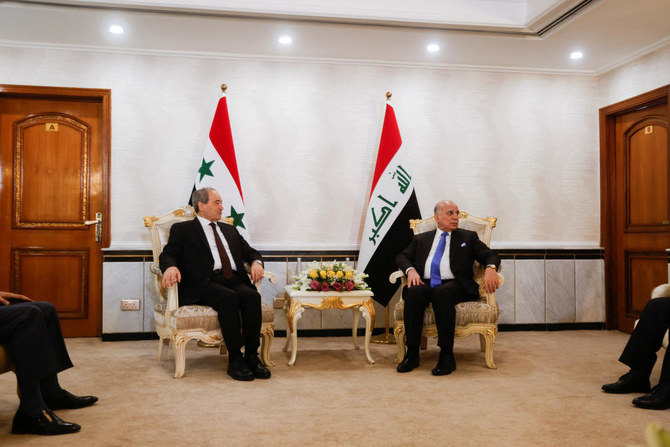BAGHDAD (AFP): Syria’s foreign minister has arrived in Iraq for a visit to its longtime ally and talks with its premier, at a time Damascus is emerging from years of diplomatic isolation.
The visit by Faisal Mekdad comes weeks after the Arab League agreed to end Syria’s suspension from the 22-member bloc, bringing the regime of President Bashar Assad back into the regional fold after years of civil war.
Iraq remained an ally to Damascus throughout the wider Arab boycott, never severing relations and maintaining close cooperation during Syria’s civil war, particularly over the fight against the Daesh group.
Mekdad arrived in Baghdad Saturday night, said Iraq’s state news agency.
He is expected to meet Iraqi Prime Minister Mohamed Shia Al-Sudani, President Abdul Latif Rashid and Foreign Minister Fuad Hussein, Iraqi foreign ministry spokesman Ahmed Al-Sahaf told the news agency.
“The visit will focus on bilateral relations between Baghdad and Damascus and on Iraq’s role in Syria’s return to the Arab League,” Sahaf said.
The Arab League voted on May 7 to readmit Syria after its suspension in 2011 over Assad’s brutal repression of pro-democracy protests that later devolved into an all-out war.
At the time, Iraq had abstained from the vote that resulted in Damascus’ suspension.
The two countries share a 600-kilometer (370-mile) porous desert border that has continued to see militant activity even years after the defeat of IS.
The militant group took over large swathes of both countries in 2014, declaring its “caliphate” before it was defeated in 2017 in Iraq and in 2019 in Syria.
Drug trafficking has also proliferated in past years, with the trade of the amphetamine-like drug captagon exploding in the region, much of it traveling through that border.
Iraqi guards in March seized over three million captagon pills at the border with Syria.
In addition to security coordination, Baghdad and Damascus continue to coordinate on other key issues including water as both countries face dangerous shortages.
Dam-building in neighboring countries and climate change impacts have dramatically reduced water flows in both countries, disrupting agriculture and threatening livelihoods amid persistent economic challenges.







